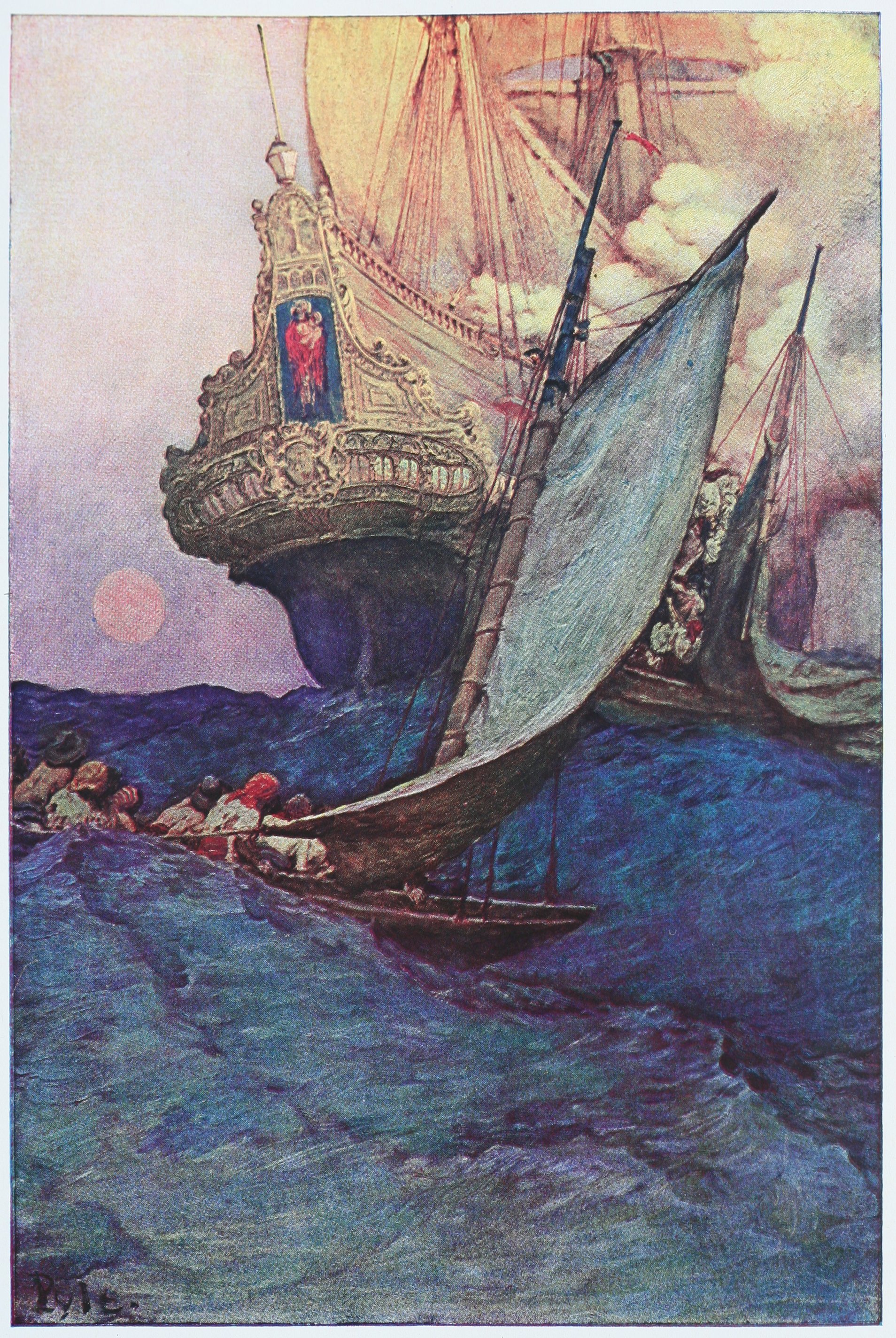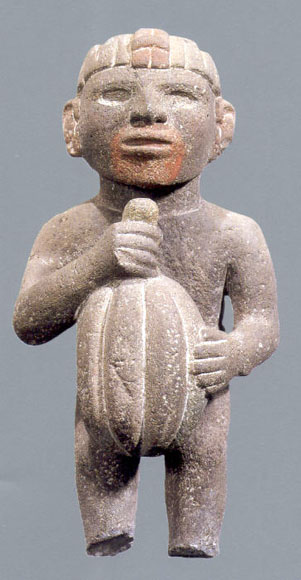|
Moïse Vauquelin
Moïse Vauquelin or Moses Vanclein ( fl. 1650–1670) was a 17th-century French buccaneer. During his four-year career as a pirate, he served as an officer under l'Ollonais and formed a brief partnership with Pierre Le Picard. He and Philippe Bequel later co-wrote a book detailing their explorations of the Honduran and Yucatán coastline. Biography Vauquelin first arrived in the Caribbean from Normandy, France around 1650. He was part of a buccaneering fleet being organized by l'Ollonais at the pirate haven of Tortuga and which would loot and plunder Spanish settlements throughout the Spanish Main during the next two years. Vauquelin was one of several officers serving in this expedition and was present at the raids against Maracaibo and Gibraltar in 1666 and Puerto de Cavallo and San Pedro in 1667. l'Ollonais and his fleet eventually split up, arguing over l'Ollonais desire to sail for Guatemala, shortly after the capture of a Spanish ship off the coast of the Yucatán. H ... [...More Info...] [...Related Items...] OR: [Wikipedia] [Google] [Baidu] |
Buccaneer
Buccaneers were a kind of privateers or free sailors particular to the Caribbean Sea during the 17th and 18th centuries. First established on northern Hispaniola as early as 1625, their heyday was from Stuart Restoration, the Restoration in 1660 until about 1688, during a time when governments were not strong enough and did not consistently attempt to suppress them. Originally the name applied to the landless hunters of wild boars and cattle in the largely uninhabited areas of Tortuga (Haiti), Tortuga and Hispaniola. The meat they caught was smoked over a slow fire in little huts the French called ''boucans'' to make ''viande boucanée'' – ''jerked meat'' or ''jerky'' – which they sold to the French corsairs, corsairs who preyed on the (largely Spanish) shipping and settlements of the Caribbean. Eventually the term was applied to the corsairs and (later) privateers themselves, also known as the Brethren of the Coast. Though corsairs, also known as ''filibusters'' or ''freeb ... [...More Info...] [...Related Items...] OR: [Wikipedia] [Google] [Baidu] |
Costa Rica
Costa Rica (, ; ; literally "Rich Coast"), officially the Republic of Costa Rica ( es, República de Costa Rica), is a country in the Central American region of North America, bordered by Nicaragua to the north, the Caribbean Sea to the northeast, Panama to the southeast, the Pacific Ocean to the southwest, and Maritime boundary, maritime border with Ecuador to the south of Cocos Island. It has a population of around five million in a land area of . An estimated 333,980 people live in the capital and largest city, San José, Costa Rica, San José, with around two million people in the surrounding metropolitan area. The sovereign state is a Unitary state, unitary Presidential system, presidential Constitution of Costa Rica, constitutional republic. It has a long-standing and stable democracy and a highly educated workforce. The country spends roughly 6.9% of its budget (2016) on education, compared to a global average of 4.4%. Its economy, once heavily dependent on agricultu ... [...More Info...] [...Related Items...] OR: [Wikipedia] [Google] [Baidu] |
People Of Saint-Domingue
A person ( : people) is a being that has certain capacities or attributes such as reason, morality, consciousness or self-consciousness, and being a part of a culturally established form of social relations such as kinship, ownership of property, or legal responsibility. The defining features of personhood and, consequently, what makes a person count as a person, differ widely among cultures and contexts. In addition to the question of personhood, of what makes a being count as a person to begin with, there are further questions about personal identity and self: both about what makes any particular person that particular person instead of another, and about what makes a person at one time the same person as they were or will be at another time despite any intervening changes. The plural form "people" is often used to refer to an entire nation or ethnic group (as in "a people"), and this was the original meaning of the word; it subsequently acquired its use as a plural form of per ... [...More Info...] [...Related Items...] OR: [Wikipedia] [Google] [Baidu] |
People From Normandy
A person ( : people) is a being that has certain capacities or attributes such as reason, morality, consciousness or self-consciousness, and being a part of a culturally established form of social relations such as kinship, ownership of property, or legal responsibility. The defining features of personhood and, consequently, what makes a person count as a person, differ widely among cultures and contexts. In addition to the question of personhood, of what makes a being count as a person to begin with, there are further questions about personal identity and self: both about what makes any particular person that particular person instead of another, and about what makes a person at one time the same person as they were or will be at another time despite any intervening changes. The plural form "people" is often used to refer to an entire nation or ethnic group (as in "a people"), and this was the original meaning of the word; it subsequently acquired its use as a plural form of ... [...More Info...] [...Related Items...] OR: [Wikipedia] [Google] [Baidu] |
French Pirates
French (french: français(e), link=no) may refer to: * Something of, from, or related to France ** French language, which originated in France, and its various dialects and accents ** French people, a nation and ethnic group identified with France ** French cuisine, cooking traditions and practices Fortnite French places Arts and media * The French (band), a British rock band * "French" (episode), a live-action episode of ''The Super Mario Bros. Super Show!'' * ''Française'' (film), 2008 * French Stewart (born 1964), American actor Other uses * French (surname), a surname (including a list of people with the name) * French (tunic), a particular type of military jacket or tunic used in the Russian Empire and Soviet Union * French's, an American brand of mustard condiment * French catheter scale, a unit of measurement of diameter * French Defence, a chess opening * French kiss, a type of kiss involving the tongue See also * France (other) * Franch, a surname * French ... [...More Info...] [...Related Items...] OR: [Wikipedia] [Google] [Baidu] |
French Navy
The French Navy (french: Marine nationale, lit=National Navy), informally , is the maritime arm of the French Armed Forces and one of the five military service branches of France. It is among the largest and most powerful naval forces in the world, ranking seventh in combined fleet tonnage and fifth in number of naval vessels. The French Navy is one of eight naval forces currently operating fixed-wing aircraft carriers,Along with the U.S., U.K., China, Russia, Italy, India and Spain with its flagship being the only nuclear-powered aircraft carrier outside the United States Navy, and one of two non-American vessels to use catapults to launch aircraft. Founded in the 17th century, the French Navy is one of the oldest navies still in continual service, with precursors dating back to the Middle Ages. It has taken part in key events in French history, including the Napoleonic Wars and both world wars, and played a critical role in establishing and securing the French colonial ... [...More Info...] [...Related Items...] OR: [Wikipedia] [Google] [Baidu] |
Jean D'Estrées
Jean d'Estrées (; 1666 – 3 March 1718) was a French priest and politician. He was the son of Jean II d'Estrées and his wife Marie Marguerite Morin. He was born in Paris, the nephew of Cardinal César d'Estrées and brother of Marshal Victor Marie d'Estrées, both academics. In 1691, Jean d'Estrées was abbot of Villeneuve, and in that capacity attended the States of Nantes.Pierre-Hyacinthe Morice, ''Histoire ecclesiastique et civile de Bretagne'' (1756) p. 154 (cliv)/ref> In 1692, he was given his first diplomatic mission, being responsible for the assurance of Portuguese neutrality during the War of the Grand Alliance. Earning a doctorate in theology in 1698, he became the abbot of Évron. In 1703, he joined his uncle in Spain, who was the ambassador to France, and succeeded him after two years. In 1711 he was elected to l'Académie française, which had searched for a suitable candidate to replace his well-known predecessor, Nicolas Boileau-Despréaux. Jean d'Estré ... [...More Info...] [...Related Items...] OR: [Wikipedia] [Google] [Baidu] |
Havana, Cuba
Havana (; Spanish: ''La Habana'' ) is the capital and largest city of Cuba. The heart of the La Habana Province, Havana is the country's main port and commercial center.Cuba ''The World Factbook''. Central Intelligence Agency. The city has a population of 2.3million inhabitants, and it spans a total of – making it the largest city by area, the most populous city, and the List of metropolitan areas in the West Indies, fourth largest metropolitan area in the Caribbean region. The city of Havana was founded by the Spanish Empire, Spanish in the 16th century, it served as a springboard for the Spanish colonization of the Americas, Spanish conquest of the Americas becoming a stopping point for Spanish galleons returning to Spain. ... [...More Info...] [...Related Items...] OR: [Wikipedia] [Google] [Baidu] |
Cocoa Bean
The cocoa bean (technically cocoa seed) or simply cocoa (), also called the cacao bean (technically cacao seed) or cacao (), is the dried and fully fermented seed of ''Theobroma cacao'', from which cocoa solids (a mixture of nonfat substances) and cocoa butter (the fat) can be extracted. Cocoa beans are the basis of chocolate, and Mesoamerican foods including tejate, an indigenous Mexican drink that also includes maize, and pinolillo, a similar Nicaraguan drink made from a cornmeal & cocoa powder. Etymology The word ''cocoa'' comes from the Spanish word , which is derived from the Nahuatl word . The Nahuatl word, in turn, ultimately derives from the reconstructed Proto-Mixe–Zoquean word ''kakawa''. Used on its own, the term ''cocoa'' may also mean: * Hot cocoa, the drink more known as ''hot chocolate'' Terms derived from ''cocoa'' include: * Cocoa paste, ground cocoa beans: the mass is melted and separated into: ** Cocoa butter, a pale, yellow, edible fat ** Cocoa s ... [...More Info...] [...Related Items...] OR: [Wikipedia] [Google] [Baidu] |
Chevalier Du Plessis
Chevalier du Plessis was a French pirate active in the West Indies in the 1660s. Du Plessis allowed fellow privateer Moïse Vauquelin Moïse Vauquelin or Moses Vanclein ( fl. 1650–1670) was a 17th-century French buccaneer. During his four-year career as a pirate, he served as an officer under l'Ollonais and formed a brief partnership with Pierre Le Picard. He and Philippe Be ... to work on board and when he died in 1668, Vauquelin succeeded him as captain. References {{DEFAULTSORT:du Plessis, Chevalier French pirates Caribbean pirates 17th-century pirates 1668 deaths ... [...More Info...] [...Related Items...] OR: [Wikipedia] [Google] [Baidu] |
Alexander Esquemeling
Alexandre Olivier Exquemelin (also spelled ''Esquemeling'', ''Exquemeling'', or ''Oexmelin'') (c. 1645–1707) was a French, Dutch or Flemish writer best known as the author of one of the most important sourcebooks of 17th-century piracy, first published in Dutch as ''De Americaensche Zee-Roovers'', in Amsterdam, by Jan ten Hoorn, in 1678. Born about 1645, it is likely that Exquemelin was a native of Honfleur, France, who on his return from buccaneering settled in Holland, possibly because he was a Huguenot. In 1666 he was engaged by the French West India Company and went to Tortuga, where he worked as an indentured servant for three years. There he enlisted with the buccaneers, in particular with the band of Henry Morgan, whose confidante he was, probably as a barber-surgeon, and remained with them until 1674. Shortly afterwards he returned to Europe and settled in Amsterdam where he qualified professionally as a surgeon, his name appearing on the 1679 register of the Dutch Su ... [...More Info...] [...Related Items...] OR: [Wikipedia] [Google] [Baidu] |

_1938.jpg)


.jpg)